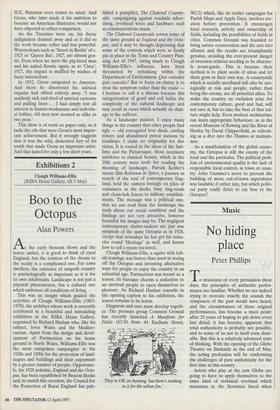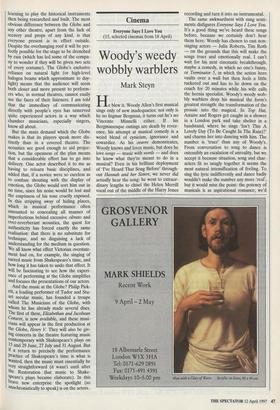Music
No hiding place
Peter Phillips
To musicians of every persuasion these days, the principles of authentic perfor- mance are familiar. Whether we are indeed trying to recreate exactly the sounds the composers of the past would have heard, and the circumstances of those original performances, has become a moot point: after 25 years of hoping to pin down every last detail, it has become apparent that total authenticity is probably not possible, and to some of us not in itself even desir- able. But this is a relatively advanced state of thinking. With the opening of the Globe Theatre on Bankside at the end of May, the acting profession will be confronting the challenges of pure authenticity for the first time in this country.
Actors who play at the new Globe are going to have to apply themselves to the same kind of technical overhaul which musicians in the Seventies faced when learning to play the historical instruments then being researched and built. The most obvious difference between the Globe and any other theatre, apart from the lack of scenery and props of any kind, is that everyone present is in effect outside. Despite the overhanging roof it will be per- fectly possible for the stage to be drenched by rain (which has led some of the compa- ny to wonder if they will be given two sets of every costume). The Globe's exclusive reliance on natural light (or high-level halogen beams which approximate to day- light) means that the audience will seem both closer and more present to perform- ers who, in normal theatres, cannot easily see the faces of their listeners. I am told that the immediacy of communicating directly with people's eyes has unnerved quite experienced actors in a way which chamber musicians, especially singers, know all about.
But the main demand which the Globe makes is that its players speak more dis- tinctly than in a covered theatre. The acoustics are good enough to aid projec- tion, but the openness of the plan means that a considerable effort has to go into delivery. One actor described it to me as having to relearn basic disciplines, and added that, if a novice were so careless as to confuse shouting with the display of emotion, the Globe would sort him out in no time, since his noise would be lost and the emptiness of his tone cruelly exposed. In this stripping away of hiding places, Which in musical performance often amounted to concealing all manner of imperfections behind excessive vibrato and over-reverberant acoustics, the quest for authenticity has forced exactly the same realisation: that there is no substitute for technique, and no disguising a lack of understanding for the medium in question. We all know what effect Victorian overstate- ment had on, for example, the singing of sacred music from Shakespeare's time, and how long it has taken to undo that effect. It Will be fascinating to see how the experi- ence of performing at the Globe simplifies and focuses the presentations of our actors.
And the music at the Globe? Philip Pick- ett a leading performer of Tudor and Stu- art secular music, has founded a troupe called The Musicians of the Globe, with Whom he has already made several discs. The first of these, Elizabethan and Jacobean Consort, is now available, and these musi- cians will appear in the first production at the Globe, Henry V. They will also be giv- ing concerts in the theatre featuring music contemporary with Shakespeare's plays on I-5 and 29 June, 27 July and 31 August. But if a return to precisely the performance Practice of Shakespeare's time is what is Wanted, then the music must essentially be very straightforward (it wasn't until after the Restoration that music to Shake- speare's plays became elaborate). In this brave new enterprise the spotlight (so anachronistically to speak) is on the actors.



































































 Previous page
Previous page